2022年中考英语二轮专题复习课件:专题七 动词种类和动词短语(92张ppt)
文档属性
| 名称 | 2022年中考英语二轮专题复习课件:专题七 动词种类和动词短语(92张ppt) | 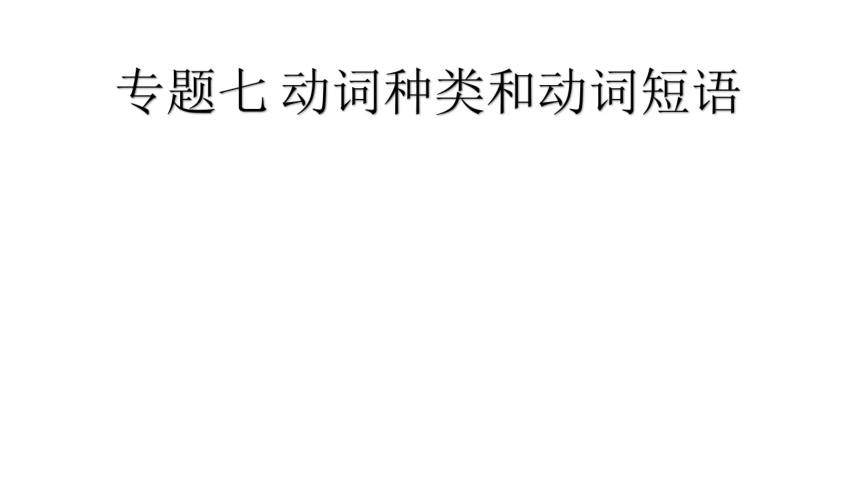 | |
| 格式 | zip | ||
| 文件大小 | 4.6MB | ||
| 资源类型 | 教案 | ||
| 版本资源 | 人教新目标(Go for it)版 | ||
| 科目 | 英语 | ||
| 更新时间 | 2022-03-09 22:41:03 | ||
图片预览

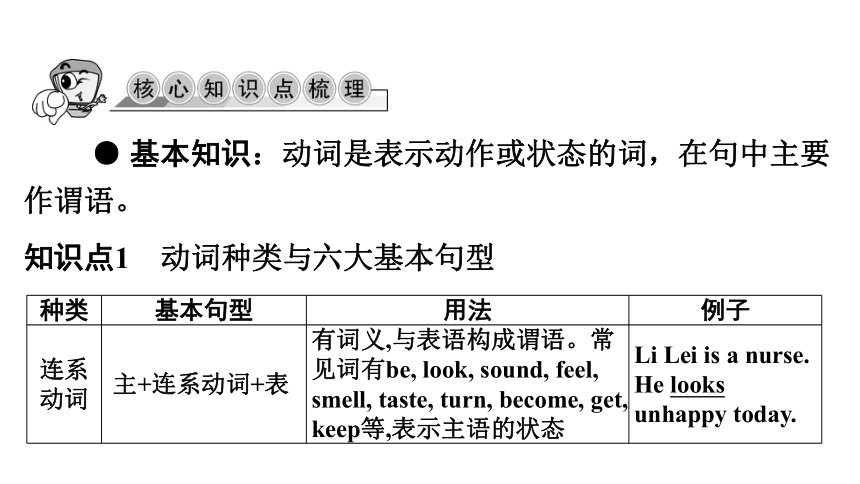
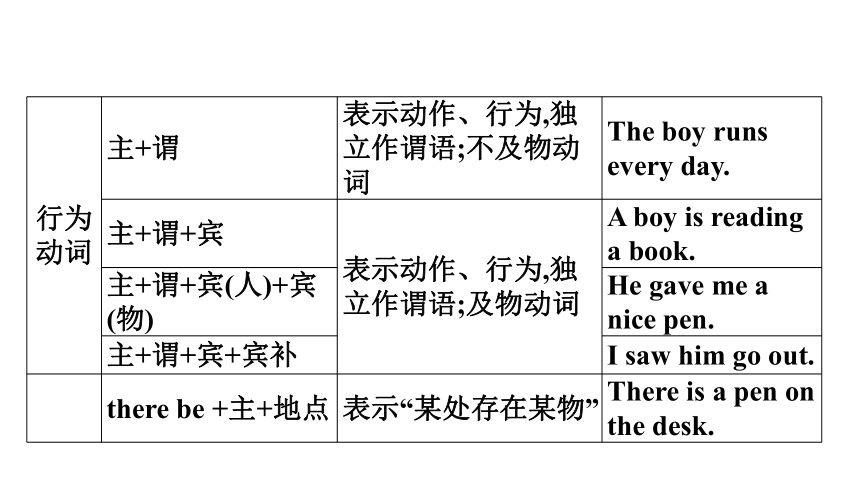
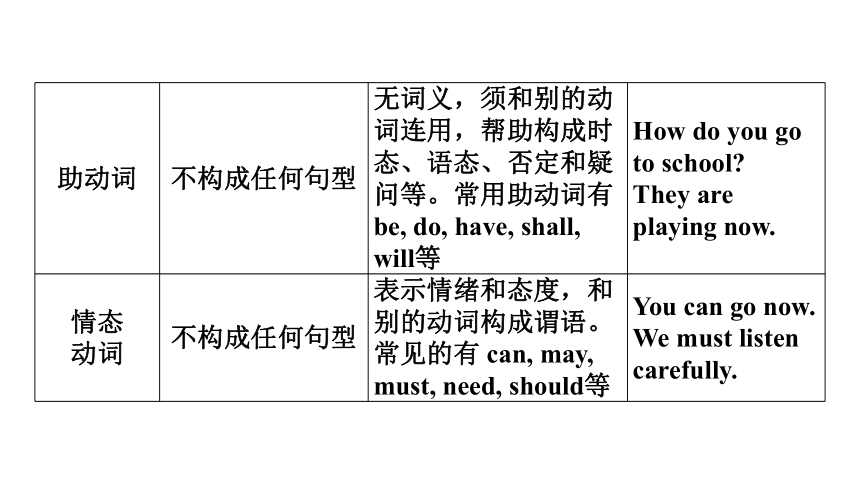
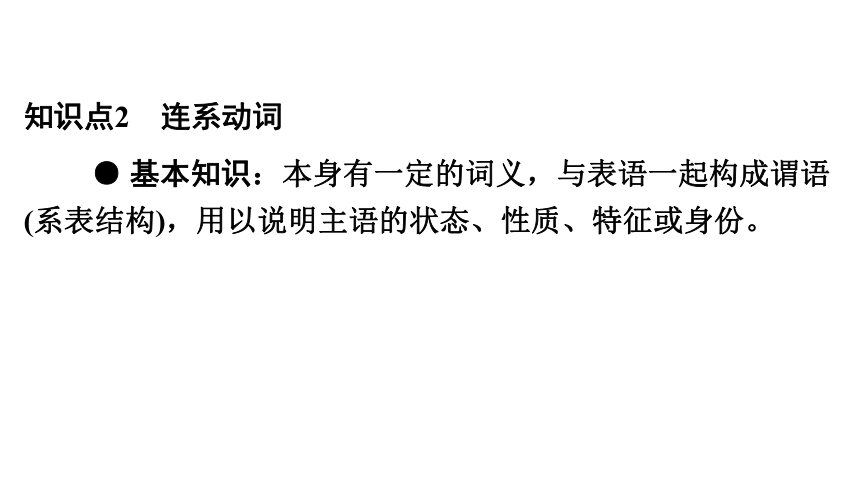
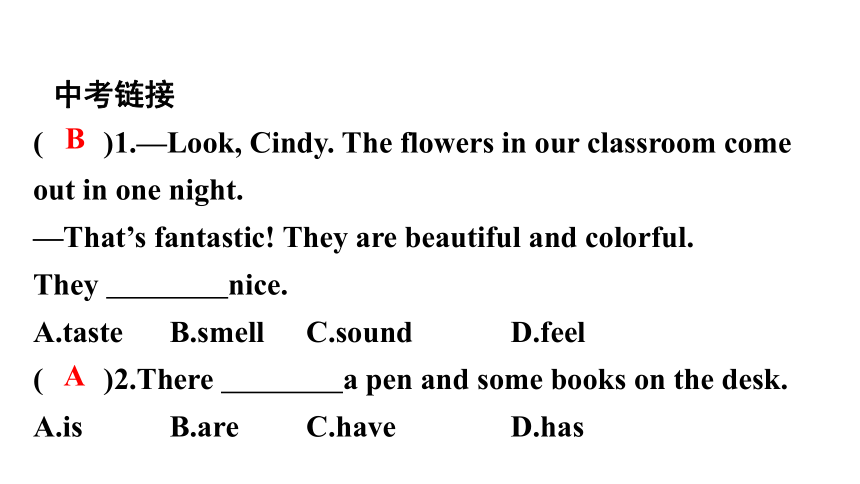
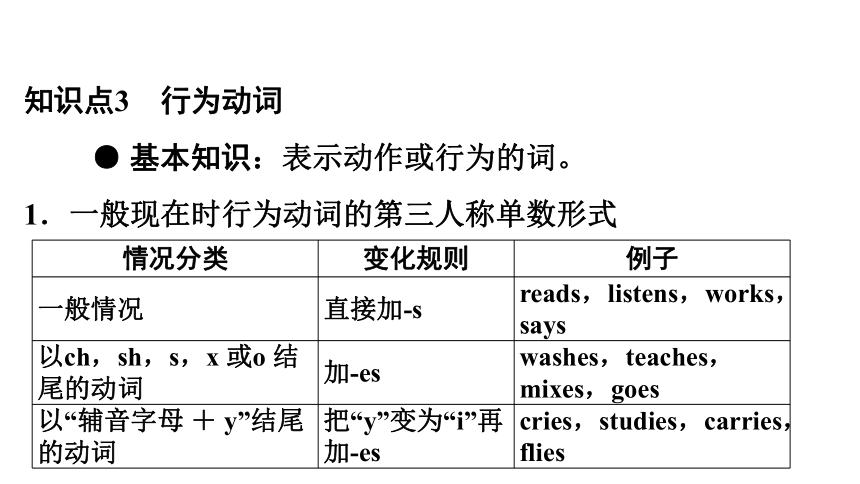
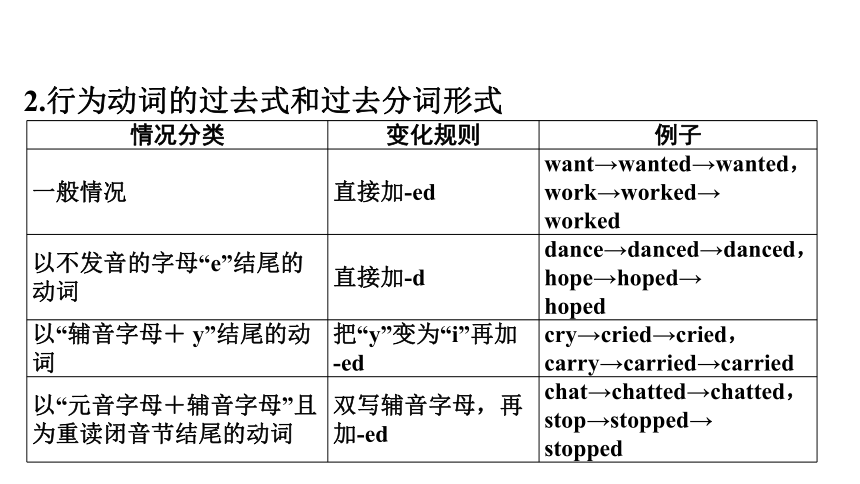
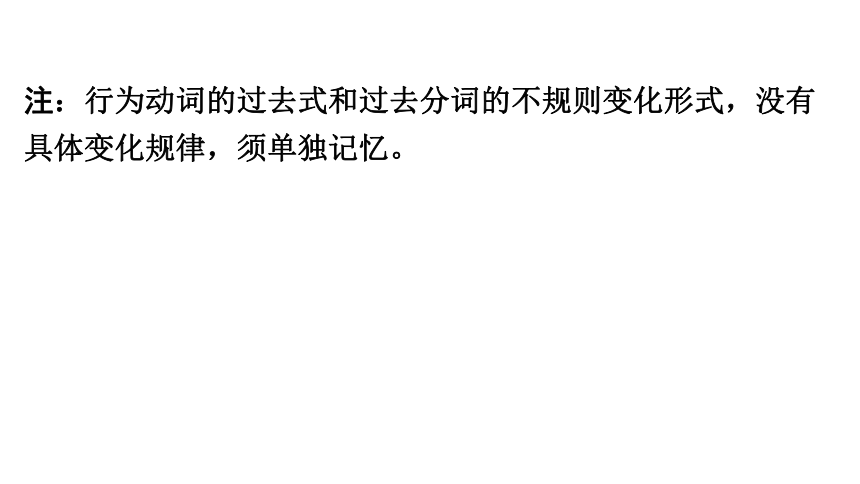
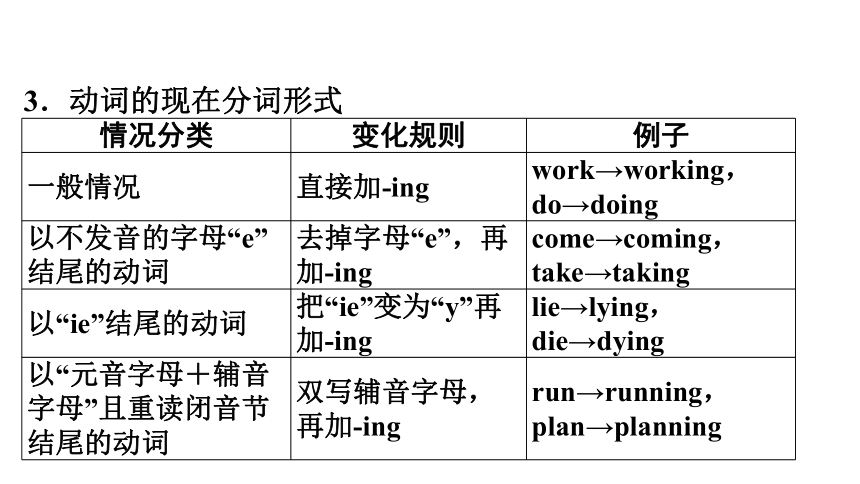
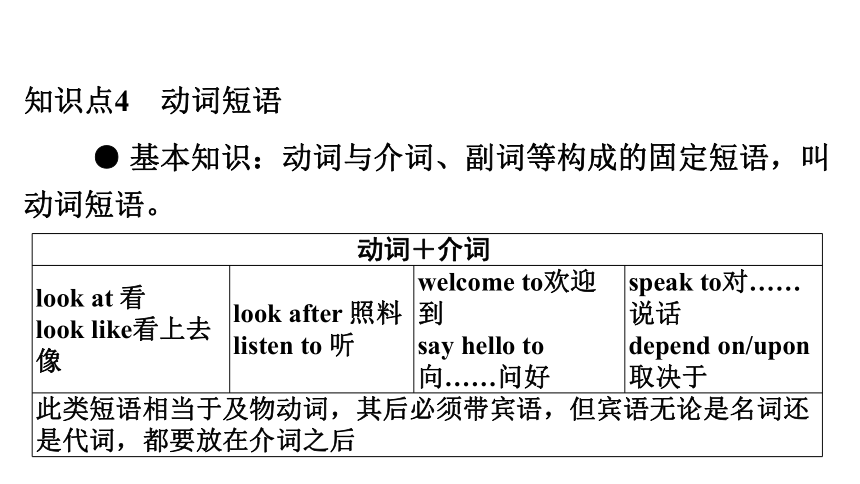
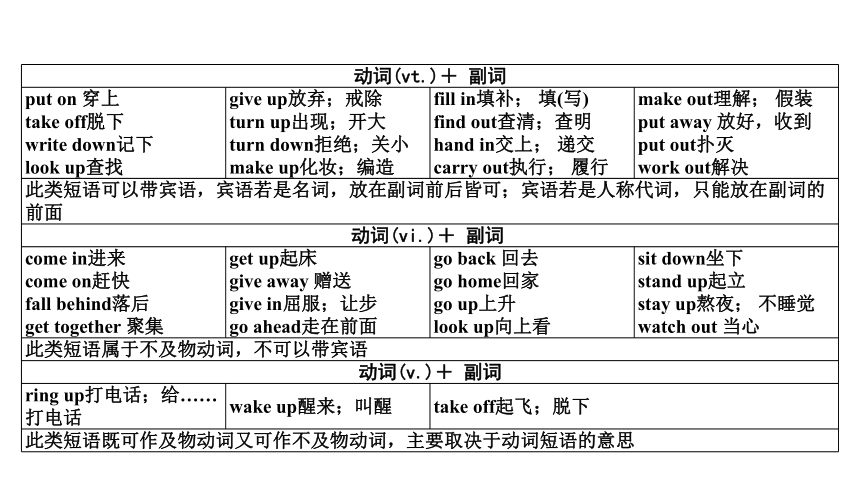
文档简介
(共92张PPT)
专题七 动词种类和动词短语
● 基本知识:动词是表示动作或状态的词,在句中主要作谓语。
知识点1 动词种类与六大基本句型
种类 基本句型 用法 例子
连系 动词 主+连系动词+表 有词义,与表语构成谓语。常见词有be, look, sound, feel, smell, taste, turn, become, get, keep等,表示主语的状态 Li Lei is a nurse.
He looks unhappy today.
行为 动词 主+谓 表示动作、行为,独立作谓语;不及物动词 The boy runs every day.
主+谓+宾 表示动作、行为,独立作谓语;及物动词 A boy is reading a book.
主+谓+宾(人)+宾(物) He gave me a nice pen.
主+谓+宾+宾补 I saw him go out.
there be +主+地点 表示“某处存在某物” There is a pen on the desk.
助动词 不构成任何句型 无词义,须和别的动词连用,帮助构成时态、语态、否定和疑问等。常用助动词有be, do, have, shall, will等 How do you go to school
They are playing now.
情态 动词 不构成任何句型 表示情绪和态度,和别的动词构成谓语。常见的有 can, may, must, need, should等 You can go now.
We must listen carefully.
知识点2 连系动词
● 基本知识:本身有一定的词义,与表语一起构成谓语(系表结构),用以说明主语的状态、性质、特征或身份。
中考链接
( )1.—Look, Cindy. The flowers in our classroom come out in one night.
—That’s fantastic! They are beautiful and colorful.
They nice.
A.taste B.smell C.sound D.feel
( )2.There a pen and some books on the desk.
A.is B.are C.have D.has
A
B
知识点3 行为动词
● 基本知识:表示动作或行为的词。
1.一般现在时行为动词的第三人称单数形式
情况分类 变化规则 例子
一般情况 直接加 s reads,listens,works,says
以ch,sh,s,x 或o 结尾的动词 加 es washes,teaches,mixes,goes
以“辅音字母 + y”结尾的动词 把“y”变为“i”再加 es cries,studies,carries,flies
2.行为动词的过去式和过去分词形式
情况分类 变化规则 例子
一般情况 直接加 ed want→wanted→wanted,work→worked→
worked
以不发音的字母“e”结尾的动词 直接加 d dance→danced→danced,hope→hoped→
hoped
以“辅音字母+ y”结尾的动词 把“y”变为“i”再加 ed cry→cried→cried,carry→carried→carried
以“元音字母+辅音字母”且为重读闭音节结尾的动词 双写辅音字母,再加 ed chat→chatted→chatted,stop→stopped→
stopped
注:行为动词的过去式和过去分词的不规则变化形式,没有具体变化规律,须单独记忆。
3.动词的现在分词形式
情况分类 变化规则 例子
一般情况 直接加 ing work→working,do→doing
以不发音的字母“e”结尾的动词 去掉字母“e”,再加 ing come→coming,take→taking
以“ie”结尾的动词 把“ie”变为“y”再加 ing lie→lying,die→dying
以“元音字母+辅音字母”且重读闭音节结尾的动词 双写辅音字母,再加 ing run→running,plan→planning
知识点4 动词短语
● 基本知识:动词与介词、副词等构成的固定短语,叫动词短语。
动词+介词 look at 看 look like看上去像 look after 照料 listen to 听 welcome to欢迎到 say hello to向……问好 speak to对……说话
depend on/upon 取决于
此类短语相当于及物动词,其后必须带宾语,但宾语无论是名词还是代词,都要放在介词之后 动词(vt.)+ 副词 put on 穿上 take off脱下 write down记下 look up查找 give up放弃;戒除 turn up出现;开大 turn down拒绝;关小 make up化妆;编造 fill in填补; 填(写) find out查清;查明 hand in交上; 递交 carry out执行; 履行 make out理解; 假装
put away 放好,收到
put out扑灭
work out解决
此类短语可以带宾语,宾语若是名词,放在副词前后皆可;宾语若是人称代词,只能放在副词的前面 动词(vi.)+ 副词 come in进来 come on赶快 fall behind落后 get together 聚集 get up起床 give away 赠送 give in屈服;让步 go ahead走在前面 go back 回去 go home回家 go up上升 look up向上看 sit down坐下
stand up起立
stay up熬夜; 不睡觉
watch out 当心
此类短语属于不及物动词,不可以带宾语 动词(v.)+ 副词 ring up打电话;给……打电话 wake up醒来;叫醒 take off起飞;脱下 此类短语既可作及物动词又可作不及物动词,主要取决于动词短语的意思 (续表)
动词 + 副词 + 介词 add up to总计达 looked up to抬头看;尊重 look forward to期盼 go along with一起去,赞同 come up with想出; 赶上 keep up with紧跟; 跟上 put up with忍受 look down on轻视;看不起 run out of用完; 从……跑出 动词 + 名词 have a look看一看 take a rest休息一下 give a talk做报告 make an effort努力
常见的动词有have,take,give,make,后面的名词通常是由动词转化来的名词,表达了短语的真正意义 动词 + 名词 + 介词 take care of照顾;照料 pay attention to注意 make use of利用 take part in参加
中考链接
( )3.—Fangfang,shall we go to see a film on Saturday
—Sorry. I have to ________ my younger brother because my mother is out.
A.look at B.look for C.look up D.look after
( )4.A lot of schools across China ________ starting classes because of COVID 19.
A.put up B.put off C.put on D.put away
D
B
知识点5 助动词
● 基本知识:本身无词义,只能和主要动词一起构成谓语,表示否定、疑问、时态、语态等。
分类 用法 例子
be (am,is,are, was,were) 现在进行时 They are dancing now.
过去进行时 I was watching TV at that time.
被动语态 The book was written by Mo Yan.
do (does,did) 构成疑问句、否定句 Does he live in Guangzhou
构成否定祈使句 Don’t be late for school.
have (has) 构成现在完成时 He has gone to Wuhan.
will (shall) 构成一般将来时 She will leave for Qingdao tomorrow.
中考链接
( )5.________ wake up your sister,Ben. She needs a good sleep.
A.Don't B.Doesn't C.Aren't D.Can't
A
( )6.There________ a sport meet next week if it ________.
A.is going to have; doesn't rain
B.is going to be; doesn't rain
C.is going to be; won't rain
D.is going to have; won't rain
B
知识点6 情态动词
● 基本知识:有一定的词义,表示说话人的情绪和态度,或者表示可能、应该或必要等,给谓语动词增加感情、态度等色彩。
分类 用法 例子
can “能,会”,表示能力 I can’t hear you clearly.
表示请求、许可(与may互换) Can I borrow your bike
表示猜测,用于疑问句或否定句,肯定回答用may或must。否定句中意为“不可能” Can the news be true
He can’t be at home.
(续表)
could can 的过去式 表示请求,语气比can更委婉 Jim could swim at the age of 6.
Could I borrow your pen
表示猜测,意为“可能” The book could be John’s.
may 用于疑问句,表示请求、许可(与can互换),肯定回答用may,否定回答用can’t或mustn’t —May I use your dictionary
—Yes,you may./No,you can’t/mustn’t.
用于猜测,意为“或许,可能”,常用在肯定句中 Take a raincoat with you. It may rain.
might may的过去式,表示猜测,可能性更小 He told me he might be here on time.
must 表示说话人的主观看法,意为“必须”,否定式mustn’t表示“不准, 禁止”, must引导疑问句时,肯定回答用must,否定回答用needn’t或don’t have to。have to意为“不得不”,表示客观需要 You must be here before five.
—Must I do my work now
—Yes, you must./No,you needn’t.
It’s too late, I have to go now.
表示“猜测”,一般用于肯定句,意为“一定,肯定” You must be tired after working a long time.
need 意为“需要”,主要用在疑问句和否定句中;用于疑问句中,肯定回答用must,否定回答用needn’t —Need I go with you
—Yes, you must.
作行为动词时,后接动词不定式,常用在肯定句中 He needs to ask the police for help.
will 表示决心或愿望;用于疑问句表示提出请求或询问 I’ll do my best to catch up with them.
It’s hot.Will you open the windows
would will的过去式,比 will更婉转、客气 Would you do me a favour
should 表示命令、警告、允诺、征求、劝告、建议、惊奇 You should hand in the exercise book.
中考链接
( )7.—________ you give me a hand I can't move the box by myself.
—No problem.
A.Could B.Should C.Must D.Need
A
( )8.—Is that Li Ming over there
—It ________ be him. He has gone to Zhenyuan for the Dragon Boat Festival.
A.must B.mustn't C.can D.can’t
D
( )9.There is a knock at the door. It ________ my mom. It's time for her to be back home.
A.may be B.may not be
C.must be D.mustn't be
C
( )10.—How delicious the meal is! Did Kangkang's mother cook it
—It ________ be her. These days she has been in a poor village to help the people there.
A.can't B.won't C.mustn't D.needn't
A
( )11.My classmate is jumping so far! I ________ believe my eyes.
A.shouldn't B.needn't C.mustn't D.can't
D
知识点7 词义辨析
1.词义辨析
(1)arrive,get与reach
①arrive in +大地点名词;arrive at +小地点名词。②get to +地点名词。③reach+地点名词。
(2)borrow,lend与keep
①borrow表示主语“借入”某物,常与from 连用。②lend表示主语“借出”某物,常与to 连用。③keep意为“保存”,表示长时间地借。
(3)dress,put on与wear
①dress sb.给某人穿衣服。②put on穿上,戴上;表动作。③wear穿着,戴着;表状态。
(4)see,look,watch与read
①see 看见,看到;表结果。②look看,表动作,不及物动词。③watch 观看(比赛、电视)。④read 看书、报,表示阅读。
(5)bring,take,carry与fetch
①bring“拿来,带来”;表示“拿到说话人的地方”。②take意为“拿走,带走”;表示“拿到别处”。③carry意为“扛,搬”;用力移动,没有方向性。④fetch 意为“去取,去拿”;表示往返。
(6)speak,say,talk与tell
①speak 不及物动词,表示“发言;讲话”。②say及物动词,后接说的内容。③talk 不及物动词,跟to 或with,意为“同某人谈话”; 跟 about,意为“谈论某事”。④tell “讲(故事等)”; tell sb.to do sth.指某人把某一件事、一条信息传送给别人或讲述一件事。
(7)spend,take,pay与cost
①spend花费时间或金钱,常用于sb.spend…on sth./(in)doing sth.句型。②take表示花费时间或金钱,常用于It + takes + 时间/金钱 + to do sth.句型。③pay意为“支付”,常用于sb.pay… for…句型。④cost 物作主语,意为“值多少钱”。
(8)look for,find与find out
①look for强调寻找的过程。
②find强调寻找的结果。③find out意为“弄清楚,查明”,指查清一件事情或某个情况等。
(9)listen to与hear
①listen to强调听的过程,即“听”。②hear 强调听的结果,即“听见、听到”。
(10)hear of与hear from
①hear of “听说”,可用about 代替of。②hear from“收到……的来信;得到……的消息”。
(11)beat与win
①beat指“打败,击败”对手、对方。②win “赢得”比赛、地位、战斗。
(12)lose,forget与leave
①lose意为“丢失;失去”。②forget意为“忘记”。③leave意为“落下;忘记带”。
(13)join,take part in与attend
①join 一般指加入党派或组织,如参军、入党等。②take part in 指参加某种活动。③attend 指出席会议,含“到场”之意。
(14)used to与be used to
①used to do sth.表示过去常常做某事。②be used to doing sth.表示“习惯于做某事”。
(15)accept与receive
①accept“接受”,表示主观意愿。②receive“接到,收到,受到”,表示客观情况,与主观意愿无关。
(16)agree to与agree with
①agree to“同意,应允”,通常用于同意某件事情。②agree with“同意,赞同”,表示同某人意见一致,后面常常接某人。
(17)wish,want,hope与expect
①wish表示“祝愿,祝福”。②want“想”,常用于want to do sth.或want sb.to do sth.。③hope“希望”,表示对愿望抱有信心,不可使用hope sb.to do sth.。
④expect“期待,期盼,盼望,预料”等,指对某一事件或物抱有期望。
(18)improve,increase,raise与rise
①improve指状态或性质上的改进,能力的提高。②increase指数量、强度和大小等的扩大、增长。③raise及物动词,“抬高,提起”。④rise不及物动词,指河水、价格“上升,上涨”。
(19)thanks for与thanks to
①thanks for 表示“为……感谢”。②thanks to表示“多亏/由于……”。
2.即时训练
练习1:选择arrive, get与reach,并用其正确形式填空
①She __________ the office earliest yesterday.
②We __________ at the village finally.
③How do you ________ to school
reached
arrived
get
练习2:选择borrow, lend与keep,并用其正确形式填空
①How long can I _________ the book
②I ___________ a book from the library yesterday.
③Could you ________ your pen to me
keep
borrowed
lend
练习3:选择dress, put on与wear,并用其正确形式填空
①Lily is _________ a red skirt today.
②He _________ on his coat and went out.
③The boy ___________ himself quickly.
wearing
put
dressed
练习4:选择see, look, watch与read,并用其正确形式填空
①________ ,there is a kite in the sky.
②Don’t ______ books in the sun.
③I _______ an apple on the table.
④I like __________ football matches.
Look
read
saw
watching
练习5:选择bring, take, carry与fetch,并用其正确形式填空
①Please _________ the books to the classroom.
②He _________ the bag to the town.
③She's gone to the school to ______ the homework.
④________ your homework to school tomorrow.
take
carried
fetch
Bring
练习6:选择speak, say, talk与tell,并用其正确形式填空
①He can _________ English and a little Chinese.
②He is _________ with his friend.
③He _______ that he saw the man yesterday.
④He ______ me not to bring you anything.
speak
talking
said
told
练习7:选择spend, take, pay与cost,并用其正确形式填空
①I _______ them 20 pounds for this room each month.
②A new computer ________ a lot of money.
③ They _______ two years building this bridge.
④It _______ them three years to build this road.
pay
costs
spent
took
练习8:选择look for, find与find out,并用其正确形式填空
①We _______ Li Ming near the shop yesterday.
②Please ______________ when the train leaves.
③What are you___________
found
find out
looking for
练习9:选择listen to与hear,并用其正确形式填空
①Speak louder so everyone can ________ you.
②When she arrived,I was ________________ music.
练习10:选择hear of与hear from,并用其正确形式填空
①We have not ____________ him since he left.
②We are all glad to __________ your success.
hear
listening to
heard from
hear of
练习11:选择beat与win,并用其正确形式填空
①He ________ the match at the sports meeting.
②He ______ the other players in the 100 race.
练习12:选择lose, forget与leave,并用其正确形式填空
①I ________ your name.
②I _______ my watch at home.
③I _______ my watch.
won
beat
forgot
left
lost
练习13:选择join, take part in与attend,并用其正确形式填空
①All the students ______________ the cleaning.
②He _________ the Party last year.
③He did not ________ the meeting yesterday.
took part in
joined
attend
练习14:选择used to与be used to,并用其正确形式填空
①I ____________ get up at six when I was young.
②I _____________ the life in the south.
练习15:选择accept与receive,并用其正确形式填空
①I _________ a letter from him yesterday.
②He ________ the present,but he did not _______ it.
used to
am used to
received
received
accept
练习16:选择agree to与agree with,并用其正确形式填空
①I quite ___________ you.
②Do you ___________ this plan
agree with
agree to
练习17:选择wish, want, hope与expect,并用其正确形式填空
①We are __________ a letter from her.
②I ___________ to be a doctor.
③She ________ me to go to Shenzhen with her.
④I _______ you success.
expecting
hope/want
wants
wish
练习18:选择improve, increase, raise与rise,并用其正确形式填空
①Wide reading will __________ your vocabulary.
②He ________ his glass and answered the question.
③Time won’t __________ the situation.
④The river is __________ after the rain.
increase
raised
improve
rising
练习19:选择thanks for与thanks to,并用其正确形式填空
①____________ your umbrella.
②___________ the doctor,I am well again.
Thanks for
Thanks to
一、实战演练
( )1.—Good morning. I'd like a birthday gift for my mother.
—What about this scarf It is beautiful and it ________ soft and smooth.
A.feels B.looks C.seems D.becomes
A
( )2.—Has Jane done the washing yet
—You cannot ________ her to do such a thing.
A.want B.hope C.wish D.expect
( )3.—It's reported that Chinese ________ more than 40 minutes a day reading WeChat.
—It's true. But I think WeChat is taking too much of our time.
A.pay B.cost C.spend D.take
D
C
( )4.—________ all your things,Tom! I hate them here and there.
—OK,Mom.
A.Put up B.Put on C.Put down D.Put away
( )5.—Is the long haired man Bruce
—No,it ________ be him. He's in New York now.
A.can't B.mustn't C.needn’t D.may not
D
A
( )6.—Must I hand in my homework now,Mr Smith
—No,you ________.
A.can’t B.shouldn’t C.wouldn’t D.needn’t
( )7.—Is Mr Brown driving here
—I'm not sure. He ________ come by train.
A.may B.shall C.need D.must
D
A
( )8.Children ________ sit in the front seat of a car. It's too dangerous.
A.need B.mustn't C.must D.needn’t
( )9.The Olympic Games of 2024 will ________ in Paris.
A.take after B.take off C.take place D.take away
B
C
( )10.—Mum,I have nothing to do in my free time but do my homework.
—My dear,you should ________ a hobby like drawing or taking photos.
A.take up B.make up C.set up D.put up
A
二、能力提升
Task 1语法选择(动词种类和动词短语专练)
A
Every morning my father buys a newspaper on his way to work.Every evening my mother 1 magazines at home.
And every night, I 2 the posters with photos of David Beckham and Yao Ming on my bedroom wall before I go to sleep. Can we 3 life without paper or print
Paper was first created about 2,000 years ago, and 4 silk, cotton, bamboo, and, since the 19th century, from wood. People learned to write words on paper to make a book. But in those days, books 5 only be produced one at a time by hand. As a result, they were expensive and rare. And because there weren't many books, few people learned to read.
Then printing 6 invented in China. When printing was developed greatly at the beginning of the 11th century, books could be produced more quickly and cheaply. As a result, more people learned to read. After that, knowledge and ideas 7 quickly.
Today information can be received online, and information can be kept on CD ROMs or MP3 players.
Computers 8 already been in classrooms, and newspapers and magazines can already be read online. So will computers 9 books one day No, I don't think they can though we 10 computers very much today.
( )1.A.looks through B.look through
C.will look through D.looked through
( ) 2.A.looks at B.look at
C.looked at D.have looked at
( ) 3.A.imagines B.imagine
C.to imagine D.imagined
B
A
B
( ) 4.A.was making from B.are made from
C.is made from D.was made from
( ) 5.A.were able B.was able to C.could D.can
( ) 6.A.is B.are C.was D.were
( ) 7.A.spread B.spreading
C.are spreading D.will spread
D
C
C
A
( ) 8.A.have B.has C.had D.having
( ) 9.A.taking the place of B.took the place of
C.taken the place of D.take the place of
( ) 10.A.used B.uses C.use D.has used
A
D
C
B
A police officer saw a car driving very slowly on the side of the highway.
He thought, “This driver 11 just as dangerous as a speeder (超速的)!” So he turned on his lights quickly and pulled the driver over. Getting closer to the car, he noticed that there 12 five old ladies, two in the front seat and three in the back.
The driver who 13 nothing about what happened said to him, “Officer, I 14 understand. I was doing exactly the speed limit!” “Ma'am,” the officer replied, “you weren't speeding, but you 15 know that driving slower than the speed limit is not good, because it 16 also be a danger to other drivers. The same as a speeder.”
“No, sir. I was doing the speed limit exactly twenty two kilometers an hour!” The old woman said in a proud voice. The officer, almost unable to control his chuckle (窃笑), explained to her that “22” 17 the highway number, not the speed limit. A bit embarrassed (尴尬), the woman smiled widely and thanked the officer for 18 her misunderstanding.
“But before I let you go, ma'am, I have to ask if everyone in this car OK These women 19 to be shaking badly and they haven't made a single sound this whole time,” the officer asked. “Oh, they will be all right in a minute.We just
20 Route 119.
( ) 11.A.are B.is C.were D.was
( ) 12.A.is B.are C.was D.were
( ) 13.A.knew B.know C.knows D.known
( ) 14.A.not B.didn't C.won’t D.don’t
( ) 15.A.has to B.will have to
C.had to D.have to
B
D
A
D
D
( ) 16.A.can B.could C.was able to D.are able to
( ) 17.A.is B.was C.are D.were
( ) 18.A.point out B.pointed out
C.pointing out D.to point out
( ) 19.A.seem B.seemed C.seems D.seeming
( ) 20.A.get off B.are getting off
C.got off D.will get off
A
B
C
A
C
Task 2动词种类和动词短语与完形填空
A
“We're going to cut science class today. I know you want to come with us. Let's go!” Maybe you've 1 some kids say something like this. Do you just give in and do what the other kids 2 , or do you go to class no matter what they say
Situations like this often come up. And it is not easy to 3 your own decision when your friends want to do something you're not quite sure about. Sometimes, you 4 you should do something because everyone else is doing it. This is called “peer (同龄人) pressure (压力)”.
Some people give in because they want to be more popular or worry that others will 5 them if they don't go along with the group. Sometimes peer pressure can be good if your peers 6 you to be a better person. But most peer pressure 7 you to do something you don't really want to do.And it 8 almost everyone without exception. So what can you do to 9 it
First of all, you should be self confident. When you are self confident, you can say“no” to the people 10 to pressure you. It also helps to have a good friend who respects your beliefs.
( )1.A.heard B.helped C.felt D.made
( )2.A.complete B.control C.suggest D.avoid
( )3.A.take B.do C.accept D.make
( )4.A.answer B.feel C.explain D.guess
( )5.A.take care of B.get ready for
C.make fun of D.catch up with
A
C
D
B
C
( )6.A.agree B.encourage C.allow D.call
( )7.A.pushes B.asks C.orders D.tells
( )8.A.affects B.supports C.teaches D.stops
( )9.A.think of B.look after
C.deal with D.talk about
( ) 10.A.failing B.refusing C.learning D.trying
B
A
A
C
D
B
It was a cold morning, and Eduardo Ortega received a large envelope (信封).But he was too nervous to 11 it. He put the envelope into his pocket and 12 the school bus. When he arrived at school, he walked to the school library and sat down. He 13 a deep breath, drew the envelope out of his pocket and carefully opened it. As he read the words, “Congratulations…you have been accepted,” he was in
tears. He 14 the long hours working in the fields. After work every day, Eduardo went to the evening school. Although he 15 some classes, he became the best student.
When he was thirteen, Eduardo 16 one of his dreams — to fly on an airplane for the first time. He wrote a poem that won a prize—a trip to San Francisco. As he flew, he promised himself to become a pilot. He loved to 17 .
His father always encouraged him. Many days, he thought it was hopeless, too tired to read. But his father just smiled and told him he could 18 it.
Now, Eduardo knew his dream of becoming a pilot was not 19 .He knew that it was his father's dream, too. Now the dream 20 and he would soon fly to all the exciting areas in the world.
( ) 11.A.open B.know C.answer D.write
( ) 12.A.kept on B.put on C.worked on D.got on
( ) 13.A.took B.reached C.put D.made
( ) 14.A.waited for B.gave up
C.thought of D.talked about
( ) 15.A.watched B.missed C.took D.left
A
D
A
C
B
( ) 16.A.wanted B.found C.realized D.thought
( ) 17.A.fly B.dream C.study D.work
( ) 18.A.take B.make C.stop D.work
( )19.A.planned B.needed C.done D.lost
( )20.A.got down B.worked out
C.went on D.came true
C
A
B
D
D
Task 3动词种类和动词短语与短文填空
A
If you want to learn about the cultural relics (文物)of our country,you may consider visiting museums or reading books. Now there 1 a new way to learn about the cultural relics. It is to watch a CCTV show named
National Treasure. If you want to know more
about the new way,you 2 read on.
National Treasure is a popular TV show. It 3 10 episodes (集).It shows 27 treasures from nine museums across China. After it was shown on December 3, 2017 for the first time,it soon 4 popular. Yu Lei,the director of the show, says that it 5 national treasures come “alive”.
Although it's a show about old relics,it 6 very new and modern. There is a large LED screen on the stage. The screen 7 show every detail (细节)of the treasures.
The show tells the stories and history behind the treasures. It also 8 famous actors to act out these stories on stage.The actors even 9 modern words and sentences in their performances.
Lots of people are fans of National Treasure. One of the fans says “National Treasure 10 brought museums and relics to people in a modern and interesting way.”
1.__________ 2. 3.__________
4.__________ 5. 6.__________
7.__________ 8. 9.__________
10.
is
can
has
became
makes
looks
will/can
invites
use
has
B
Yuan Longping, a Chinese scientist, has saved people without any magic. His success on hybrid rice (杂交水稻) 11 millions of people in hunger.
Yuan was born on September 7, 1930. After graduating from university, he 12 as a teacher at an agriculture school in Hunan.
About 50 years ago, some natural disasters (灾难) hit China.Yuan saw many people 13 their lives because of hunger every day. Since then, he has 14 research on how to grow good quality rice. In 1964, he 15 a natural hybrid rice plant by accident. It had great advantages over others.Yuan 16 excited about what he discovered. He then decided to study this particular plant.
In 1973, he started to grow a type of hybrid rice. It produced 20% more rice each unit. This success 17 China the world's leader in rice production.
In China, most rice field 18 Yuan's hybrid rice. He 19 called the “Father of Hybrid Rice”.
He has a dream. He 20 Hybrid rice will grow as tall as Chinese sorghum (高粱) one day!
11.__________ 12. 13.__________
14.__________ 15. 16.__________
17.__________ 18. 19.__________
20.
fed
worked
lose
done
found
was
made
grow
is
hopes
专题七 动词种类和动词短语
● 基本知识:动词是表示动作或状态的词,在句中主要作谓语。
知识点1 动词种类与六大基本句型
种类 基本句型 用法 例子
连系 动词 主+连系动词+表 有词义,与表语构成谓语。常见词有be, look, sound, feel, smell, taste, turn, become, get, keep等,表示主语的状态 Li Lei is a nurse.
He looks unhappy today.
行为 动词 主+谓 表示动作、行为,独立作谓语;不及物动词 The boy runs every day.
主+谓+宾 表示动作、行为,独立作谓语;及物动词 A boy is reading a book.
主+谓+宾(人)+宾(物) He gave me a nice pen.
主+谓+宾+宾补 I saw him go out.
there be +主+地点 表示“某处存在某物” There is a pen on the desk.
助动词 不构成任何句型 无词义,须和别的动词连用,帮助构成时态、语态、否定和疑问等。常用助动词有be, do, have, shall, will等 How do you go to school
They are playing now.
情态 动词 不构成任何句型 表示情绪和态度,和别的动词构成谓语。常见的有 can, may, must, need, should等 You can go now.
We must listen carefully.
知识点2 连系动词
● 基本知识:本身有一定的词义,与表语一起构成谓语(系表结构),用以说明主语的状态、性质、特征或身份。
中考链接
( )1.—Look, Cindy. The flowers in our classroom come out in one night.
—That’s fantastic! They are beautiful and colorful.
They nice.
A.taste B.smell C.sound D.feel
( )2.There a pen and some books on the desk.
A.is B.are C.have D.has
A
B
知识点3 行为动词
● 基本知识:表示动作或行为的词。
1.一般现在时行为动词的第三人称单数形式
情况分类 变化规则 例子
一般情况 直接加 s reads,listens,works,says
以ch,sh,s,x 或o 结尾的动词 加 es washes,teaches,mixes,goes
以“辅音字母 + y”结尾的动词 把“y”变为“i”再加 es cries,studies,carries,flies
2.行为动词的过去式和过去分词形式
情况分类 变化规则 例子
一般情况 直接加 ed want→wanted→wanted,work→worked→
worked
以不发音的字母“e”结尾的动词 直接加 d dance→danced→danced,hope→hoped→
hoped
以“辅音字母+ y”结尾的动词 把“y”变为“i”再加 ed cry→cried→cried,carry→carried→carried
以“元音字母+辅音字母”且为重读闭音节结尾的动词 双写辅音字母,再加 ed chat→chatted→chatted,stop→stopped→
stopped
注:行为动词的过去式和过去分词的不规则变化形式,没有具体变化规律,须单独记忆。
3.动词的现在分词形式
情况分类 变化规则 例子
一般情况 直接加 ing work→working,do→doing
以不发音的字母“e”结尾的动词 去掉字母“e”,再加 ing come→coming,take→taking
以“ie”结尾的动词 把“ie”变为“y”再加 ing lie→lying,die→dying
以“元音字母+辅音字母”且重读闭音节结尾的动词 双写辅音字母,再加 ing run→running,plan→planning
知识点4 动词短语
● 基本知识:动词与介词、副词等构成的固定短语,叫动词短语。
动词+介词 look at 看 look like看上去像 look after 照料 listen to 听 welcome to欢迎到 say hello to向……问好 speak to对……说话
depend on/upon 取决于
此类短语相当于及物动词,其后必须带宾语,但宾语无论是名词还是代词,都要放在介词之后 动词(vt.)+ 副词 put on 穿上 take off脱下 write down记下 look up查找 give up放弃;戒除 turn up出现;开大 turn down拒绝;关小 make up化妆;编造 fill in填补; 填(写) find out查清;查明 hand in交上; 递交 carry out执行; 履行 make out理解; 假装
put away 放好,收到
put out扑灭
work out解决
此类短语可以带宾语,宾语若是名词,放在副词前后皆可;宾语若是人称代词,只能放在副词的前面 动词(vi.)+ 副词 come in进来 come on赶快 fall behind落后 get together 聚集 get up起床 give away 赠送 give in屈服;让步 go ahead走在前面 go back 回去 go home回家 go up上升 look up向上看 sit down坐下
stand up起立
stay up熬夜; 不睡觉
watch out 当心
此类短语属于不及物动词,不可以带宾语 动词(v.)+ 副词 ring up打电话;给……打电话 wake up醒来;叫醒 take off起飞;脱下 此类短语既可作及物动词又可作不及物动词,主要取决于动词短语的意思 (续表)
动词 + 副词 + 介词 add up to总计达 looked up to抬头看;尊重 look forward to期盼 go along with一起去,赞同 come up with想出; 赶上 keep up with紧跟; 跟上 put up with忍受 look down on轻视;看不起 run out of用完; 从……跑出 动词 + 名词 have a look看一看 take a rest休息一下 give a talk做报告 make an effort努力
常见的动词有have,take,give,make,后面的名词通常是由动词转化来的名词,表达了短语的真正意义 动词 + 名词 + 介词 take care of照顾;照料 pay attention to注意 make use of利用 take part in参加
中考链接
( )3.—Fangfang,shall we go to see a film on Saturday
—Sorry. I have to ________ my younger brother because my mother is out.
A.look at B.look for C.look up D.look after
( )4.A lot of schools across China ________ starting classes because of COVID 19.
A.put up B.put off C.put on D.put away
D
B
知识点5 助动词
● 基本知识:本身无词义,只能和主要动词一起构成谓语,表示否定、疑问、时态、语态等。
分类 用法 例子
be (am,is,are, was,were) 现在进行时 They are dancing now.
过去进行时 I was watching TV at that time.
被动语态 The book was written by Mo Yan.
do (does,did) 构成疑问句、否定句 Does he live in Guangzhou
构成否定祈使句 Don’t be late for school.
have (has) 构成现在完成时 He has gone to Wuhan.
will (shall) 构成一般将来时 She will leave for Qingdao tomorrow.
中考链接
( )5.________ wake up your sister,Ben. She needs a good sleep.
A.Don't B.Doesn't C.Aren't D.Can't
A
( )6.There________ a sport meet next week if it ________.
A.is going to have; doesn't rain
B.is going to be; doesn't rain
C.is going to be; won't rain
D.is going to have; won't rain
B
知识点6 情态动词
● 基本知识:有一定的词义,表示说话人的情绪和态度,或者表示可能、应该或必要等,给谓语动词增加感情、态度等色彩。
分类 用法 例子
can “能,会”,表示能力 I can’t hear you clearly.
表示请求、许可(与may互换) Can I borrow your bike
表示猜测,用于疑问句或否定句,肯定回答用may或must。否定句中意为“不可能” Can the news be true
He can’t be at home.
(续表)
could can 的过去式 表示请求,语气比can更委婉 Jim could swim at the age of 6.
Could I borrow your pen
表示猜测,意为“可能” The book could be John’s.
may 用于疑问句,表示请求、许可(与can互换),肯定回答用may,否定回答用can’t或mustn’t —May I use your dictionary
—Yes,you may./No,you can’t/mustn’t.
用于猜测,意为“或许,可能”,常用在肯定句中 Take a raincoat with you. It may rain.
might may的过去式,表示猜测,可能性更小 He told me he might be here on time.
must 表示说话人的主观看法,意为“必须”,否定式mustn’t表示“不准, 禁止”, must引导疑问句时,肯定回答用must,否定回答用needn’t或don’t have to。have to意为“不得不”,表示客观需要 You must be here before five.
—Must I do my work now
—Yes, you must./No,you needn’t.
It’s too late, I have to go now.
表示“猜测”,一般用于肯定句,意为“一定,肯定” You must be tired after working a long time.
need 意为“需要”,主要用在疑问句和否定句中;用于疑问句中,肯定回答用must,否定回答用needn’t —Need I go with you
—Yes, you must.
作行为动词时,后接动词不定式,常用在肯定句中 He needs to ask the police for help.
will 表示决心或愿望;用于疑问句表示提出请求或询问 I’ll do my best to catch up with them.
It’s hot.Will you open the windows
would will的过去式,比 will更婉转、客气 Would you do me a favour
should 表示命令、警告、允诺、征求、劝告、建议、惊奇 You should hand in the exercise book.
中考链接
( )7.—________ you give me a hand I can't move the box by myself.
—No problem.
A.Could B.Should C.Must D.Need
A
( )8.—Is that Li Ming over there
—It ________ be him. He has gone to Zhenyuan for the Dragon Boat Festival.
A.must B.mustn't C.can D.can’t
D
( )9.There is a knock at the door. It ________ my mom. It's time for her to be back home.
A.may be B.may not be
C.must be D.mustn't be
C
( )10.—How delicious the meal is! Did Kangkang's mother cook it
—It ________ be her. These days she has been in a poor village to help the people there.
A.can't B.won't C.mustn't D.needn't
A
( )11.My classmate is jumping so far! I ________ believe my eyes.
A.shouldn't B.needn't C.mustn't D.can't
D
知识点7 词义辨析
1.词义辨析
(1)arrive,get与reach
①arrive in +大地点名词;arrive at +小地点名词。②get to +地点名词。③reach+地点名词。
(2)borrow,lend与keep
①borrow表示主语“借入”某物,常与from 连用。②lend表示主语“借出”某物,常与to 连用。③keep意为“保存”,表示长时间地借。
(3)dress,put on与wear
①dress sb.给某人穿衣服。②put on穿上,戴上;表动作。③wear穿着,戴着;表状态。
(4)see,look,watch与read
①see 看见,看到;表结果。②look看,表动作,不及物动词。③watch 观看(比赛、电视)。④read 看书、报,表示阅读。
(5)bring,take,carry与fetch
①bring“拿来,带来”;表示“拿到说话人的地方”。②take意为“拿走,带走”;表示“拿到别处”。③carry意为“扛,搬”;用力移动,没有方向性。④fetch 意为“去取,去拿”;表示往返。
(6)speak,say,talk与tell
①speak 不及物动词,表示“发言;讲话”。②say及物动词,后接说的内容。③talk 不及物动词,跟to 或with,意为“同某人谈话”; 跟 about,意为“谈论某事”。④tell “讲(故事等)”; tell sb.to do sth.指某人把某一件事、一条信息传送给别人或讲述一件事。
(7)spend,take,pay与cost
①spend花费时间或金钱,常用于sb.spend…on sth./(in)doing sth.句型。②take表示花费时间或金钱,常用于It + takes + 时间/金钱 + to do sth.句型。③pay意为“支付”,常用于sb.pay… for…句型。④cost 物作主语,意为“值多少钱”。
(8)look for,find与find out
①look for强调寻找的过程。
②find强调寻找的结果。③find out意为“弄清楚,查明”,指查清一件事情或某个情况等。
(9)listen to与hear
①listen to强调听的过程,即“听”。②hear 强调听的结果,即“听见、听到”。
(10)hear of与hear from
①hear of “听说”,可用about 代替of。②hear from“收到……的来信;得到……的消息”。
(11)beat与win
①beat指“打败,击败”对手、对方。②win “赢得”比赛、地位、战斗。
(12)lose,forget与leave
①lose意为“丢失;失去”。②forget意为“忘记”。③leave意为“落下;忘记带”。
(13)join,take part in与attend
①join 一般指加入党派或组织,如参军、入党等。②take part in 指参加某种活动。③attend 指出席会议,含“到场”之意。
(14)used to与be used to
①used to do sth.表示过去常常做某事。②be used to doing sth.表示“习惯于做某事”。
(15)accept与receive
①accept“接受”,表示主观意愿。②receive“接到,收到,受到”,表示客观情况,与主观意愿无关。
(16)agree to与agree with
①agree to“同意,应允”,通常用于同意某件事情。②agree with“同意,赞同”,表示同某人意见一致,后面常常接某人。
(17)wish,want,hope与expect
①wish表示“祝愿,祝福”。②want“想”,常用于want to do sth.或want sb.to do sth.。③hope“希望”,表示对愿望抱有信心,不可使用hope sb.to do sth.。
④expect“期待,期盼,盼望,预料”等,指对某一事件或物抱有期望。
(18)improve,increase,raise与rise
①improve指状态或性质上的改进,能力的提高。②increase指数量、强度和大小等的扩大、增长。③raise及物动词,“抬高,提起”。④rise不及物动词,指河水、价格“上升,上涨”。
(19)thanks for与thanks to
①thanks for 表示“为……感谢”。②thanks to表示“多亏/由于……”。
2.即时训练
练习1:选择arrive, get与reach,并用其正确形式填空
①She __________ the office earliest yesterday.
②We __________ at the village finally.
③How do you ________ to school
reached
arrived
get
练习2:选择borrow, lend与keep,并用其正确形式填空
①How long can I _________ the book
②I ___________ a book from the library yesterday.
③Could you ________ your pen to me
keep
borrowed
lend
练习3:选择dress, put on与wear,并用其正确形式填空
①Lily is _________ a red skirt today.
②He _________ on his coat and went out.
③The boy ___________ himself quickly.
wearing
put
dressed
练习4:选择see, look, watch与read,并用其正确形式填空
①________ ,there is a kite in the sky.
②Don’t ______ books in the sun.
③I _______ an apple on the table.
④I like __________ football matches.
Look
read
saw
watching
练习5:选择bring, take, carry与fetch,并用其正确形式填空
①Please _________ the books to the classroom.
②He _________ the bag to the town.
③She's gone to the school to ______ the homework.
④________ your homework to school tomorrow.
take
carried
fetch
Bring
练习6:选择speak, say, talk与tell,并用其正确形式填空
①He can _________ English and a little Chinese.
②He is _________ with his friend.
③He _______ that he saw the man yesterday.
④He ______ me not to bring you anything.
speak
talking
said
told
练习7:选择spend, take, pay与cost,并用其正确形式填空
①I _______ them 20 pounds for this room each month.
②A new computer ________ a lot of money.
③ They _______ two years building this bridge.
④It _______ them three years to build this road.
pay
costs
spent
took
练习8:选择look for, find与find out,并用其正确形式填空
①We _______ Li Ming near the shop yesterday.
②Please ______________ when the train leaves.
③What are you___________
found
find out
looking for
练习9:选择listen to与hear,并用其正确形式填空
①Speak louder so everyone can ________ you.
②When she arrived,I was ________________ music.
练习10:选择hear of与hear from,并用其正确形式填空
①We have not ____________ him since he left.
②We are all glad to __________ your success.
hear
listening to
heard from
hear of
练习11:选择beat与win,并用其正确形式填空
①He ________ the match at the sports meeting.
②He ______ the other players in the 100 race.
练习12:选择lose, forget与leave,并用其正确形式填空
①I ________ your name.
②I _______ my watch at home.
③I _______ my watch.
won
beat
forgot
left
lost
练习13:选择join, take part in与attend,并用其正确形式填空
①All the students ______________ the cleaning.
②He _________ the Party last year.
③He did not ________ the meeting yesterday.
took part in
joined
attend
练习14:选择used to与be used to,并用其正确形式填空
①I ____________ get up at six when I was young.
②I _____________ the life in the south.
练习15:选择accept与receive,并用其正确形式填空
①I _________ a letter from him yesterday.
②He ________ the present,but he did not _______ it.
used to
am used to
received
received
accept
练习16:选择agree to与agree with,并用其正确形式填空
①I quite ___________ you.
②Do you ___________ this plan
agree with
agree to
练习17:选择wish, want, hope与expect,并用其正确形式填空
①We are __________ a letter from her.
②I ___________ to be a doctor.
③She ________ me to go to Shenzhen with her.
④I _______ you success.
expecting
hope/want
wants
wish
练习18:选择improve, increase, raise与rise,并用其正确形式填空
①Wide reading will __________ your vocabulary.
②He ________ his glass and answered the question.
③Time won’t __________ the situation.
④The river is __________ after the rain.
increase
raised
improve
rising
练习19:选择thanks for与thanks to,并用其正确形式填空
①____________ your umbrella.
②___________ the doctor,I am well again.
Thanks for
Thanks to
一、实战演练
( )1.—Good morning. I'd like a birthday gift for my mother.
—What about this scarf It is beautiful and it ________ soft and smooth.
A.feels B.looks C.seems D.becomes
A
( )2.—Has Jane done the washing yet
—You cannot ________ her to do such a thing.
A.want B.hope C.wish D.expect
( )3.—It's reported that Chinese ________ more than 40 minutes a day reading WeChat.
—It's true. But I think WeChat is taking too much of our time.
A.pay B.cost C.spend D.take
D
C
( )4.—________ all your things,Tom! I hate them here and there.
—OK,Mom.
A.Put up B.Put on C.Put down D.Put away
( )5.—Is the long haired man Bruce
—No,it ________ be him. He's in New York now.
A.can't B.mustn't C.needn’t D.may not
D
A
( )6.—Must I hand in my homework now,Mr Smith
—No,you ________.
A.can’t B.shouldn’t C.wouldn’t D.needn’t
( )7.—Is Mr Brown driving here
—I'm not sure. He ________ come by train.
A.may B.shall C.need D.must
D
A
( )8.Children ________ sit in the front seat of a car. It's too dangerous.
A.need B.mustn't C.must D.needn’t
( )9.The Olympic Games of 2024 will ________ in Paris.
A.take after B.take off C.take place D.take away
B
C
( )10.—Mum,I have nothing to do in my free time but do my homework.
—My dear,you should ________ a hobby like drawing or taking photos.
A.take up B.make up C.set up D.put up
A
二、能力提升
Task 1语法选择(动词种类和动词短语专练)
A
Every morning my father buys a newspaper on his way to work.Every evening my mother 1 magazines at home.
And every night, I 2 the posters with photos of David Beckham and Yao Ming on my bedroom wall before I go to sleep. Can we 3 life without paper or print
Paper was first created about 2,000 years ago, and 4 silk, cotton, bamboo, and, since the 19th century, from wood. People learned to write words on paper to make a book. But in those days, books 5 only be produced one at a time by hand. As a result, they were expensive and rare. And because there weren't many books, few people learned to read.
Then printing 6 invented in China. When printing was developed greatly at the beginning of the 11th century, books could be produced more quickly and cheaply. As a result, more people learned to read. After that, knowledge and ideas 7 quickly.
Today information can be received online, and information can be kept on CD ROMs or MP3 players.
Computers 8 already been in classrooms, and newspapers and magazines can already be read online. So will computers 9 books one day No, I don't think they can though we 10 computers very much today.
( )1.A.looks through B.look through
C.will look through D.looked through
( ) 2.A.looks at B.look at
C.looked at D.have looked at
( ) 3.A.imagines B.imagine
C.to imagine D.imagined
B
A
B
( ) 4.A.was making from B.are made from
C.is made from D.was made from
( ) 5.A.were able B.was able to C.could D.can
( ) 6.A.is B.are C.was D.were
( ) 7.A.spread B.spreading
C.are spreading D.will spread
D
C
C
A
( ) 8.A.have B.has C.had D.having
( ) 9.A.taking the place of B.took the place of
C.taken the place of D.take the place of
( ) 10.A.used B.uses C.use D.has used
A
D
C
B
A police officer saw a car driving very slowly on the side of the highway.
He thought, “This driver 11 just as dangerous as a speeder (超速的)!” So he turned on his lights quickly and pulled the driver over. Getting closer to the car, he noticed that there 12 five old ladies, two in the front seat and three in the back.
The driver who 13 nothing about what happened said to him, “Officer, I 14 understand. I was doing exactly the speed limit!” “Ma'am,” the officer replied, “you weren't speeding, but you 15 know that driving slower than the speed limit is not good, because it 16 also be a danger to other drivers. The same as a speeder.”
“No, sir. I was doing the speed limit exactly twenty two kilometers an hour!” The old woman said in a proud voice. The officer, almost unable to control his chuckle (窃笑), explained to her that “22” 17 the highway number, not the speed limit. A bit embarrassed (尴尬), the woman smiled widely and thanked the officer for 18 her misunderstanding.
“But before I let you go, ma'am, I have to ask if everyone in this car OK These women 19 to be shaking badly and they haven't made a single sound this whole time,” the officer asked. “Oh, they will be all right in a minute.We just
20 Route 119.
( ) 11.A.are B.is C.were D.was
( ) 12.A.is B.are C.was D.were
( ) 13.A.knew B.know C.knows D.known
( ) 14.A.not B.didn't C.won’t D.don’t
( ) 15.A.has to B.will have to
C.had to D.have to
B
D
A
D
D
( ) 16.A.can B.could C.was able to D.are able to
( ) 17.A.is B.was C.are D.were
( ) 18.A.point out B.pointed out
C.pointing out D.to point out
( ) 19.A.seem B.seemed C.seems D.seeming
( ) 20.A.get off B.are getting off
C.got off D.will get off
A
B
C
A
C
Task 2动词种类和动词短语与完形填空
A
“We're going to cut science class today. I know you want to come with us. Let's go!” Maybe you've 1 some kids say something like this. Do you just give in and do what the other kids 2 , or do you go to class no matter what they say
Situations like this often come up. And it is not easy to 3 your own decision when your friends want to do something you're not quite sure about. Sometimes, you 4 you should do something because everyone else is doing it. This is called “peer (同龄人) pressure (压力)”.
Some people give in because they want to be more popular or worry that others will 5 them if they don't go along with the group. Sometimes peer pressure can be good if your peers 6 you to be a better person. But most peer pressure 7 you to do something you don't really want to do.And it 8 almost everyone without exception. So what can you do to 9 it
First of all, you should be self confident. When you are self confident, you can say“no” to the people 10 to pressure you. It also helps to have a good friend who respects your beliefs.
( )1.A.heard B.helped C.felt D.made
( )2.A.complete B.control C.suggest D.avoid
( )3.A.take B.do C.accept D.make
( )4.A.answer B.feel C.explain D.guess
( )5.A.take care of B.get ready for
C.make fun of D.catch up with
A
C
D
B
C
( )6.A.agree B.encourage C.allow D.call
( )7.A.pushes B.asks C.orders D.tells
( )8.A.affects B.supports C.teaches D.stops
( )9.A.think of B.look after
C.deal with D.talk about
( ) 10.A.failing B.refusing C.learning D.trying
B
A
A
C
D
B
It was a cold morning, and Eduardo Ortega received a large envelope (信封).But he was too nervous to 11 it. He put the envelope into his pocket and 12 the school bus. When he arrived at school, he walked to the school library and sat down. He 13 a deep breath, drew the envelope out of his pocket and carefully opened it. As he read the words, “Congratulations…you have been accepted,” he was in
tears. He 14 the long hours working in the fields. After work every day, Eduardo went to the evening school. Although he 15 some classes, he became the best student.
When he was thirteen, Eduardo 16 one of his dreams — to fly on an airplane for the first time. He wrote a poem that won a prize—a trip to San Francisco. As he flew, he promised himself to become a pilot. He loved to 17 .
His father always encouraged him. Many days, he thought it was hopeless, too tired to read. But his father just smiled and told him he could 18 it.
Now, Eduardo knew his dream of becoming a pilot was not 19 .He knew that it was his father's dream, too. Now the dream 20 and he would soon fly to all the exciting areas in the world.
( ) 11.A.open B.know C.answer D.write
( ) 12.A.kept on B.put on C.worked on D.got on
( ) 13.A.took B.reached C.put D.made
( ) 14.A.waited for B.gave up
C.thought of D.talked about
( ) 15.A.watched B.missed C.took D.left
A
D
A
C
B
( ) 16.A.wanted B.found C.realized D.thought
( ) 17.A.fly B.dream C.study D.work
( ) 18.A.take B.make C.stop D.work
( )19.A.planned B.needed C.done D.lost
( )20.A.got down B.worked out
C.went on D.came true
C
A
B
D
D
Task 3动词种类和动词短语与短文填空
A
If you want to learn about the cultural relics (文物)of our country,you may consider visiting museums or reading books. Now there 1 a new way to learn about the cultural relics. It is to watch a CCTV show named
National Treasure. If you want to know more
about the new way,you 2 read on.
National Treasure is a popular TV show. It 3 10 episodes (集).It shows 27 treasures from nine museums across China. After it was shown on December 3, 2017 for the first time,it soon 4 popular. Yu Lei,the director of the show, says that it 5 national treasures come “alive”.
Although it's a show about old relics,it 6 very new and modern. There is a large LED screen on the stage. The screen 7 show every detail (细节)of the treasures.
The show tells the stories and history behind the treasures. It also 8 famous actors to act out these stories on stage.The actors even 9 modern words and sentences in their performances.
Lots of people are fans of National Treasure. One of the fans says “National Treasure 10 brought museums and relics to people in a modern and interesting way.”
1.__________ 2. 3.__________
4.__________ 5. 6.__________
7.__________ 8. 9.__________
10.
is
can
has
became
makes
looks
will/can
invites
use
has
B
Yuan Longping, a Chinese scientist, has saved people without any magic. His success on hybrid rice (杂交水稻) 11 millions of people in hunger.
Yuan was born on September 7, 1930. After graduating from university, he 12 as a teacher at an agriculture school in Hunan.
About 50 years ago, some natural disasters (灾难) hit China.Yuan saw many people 13 their lives because of hunger every day. Since then, he has 14 research on how to grow good quality rice. In 1964, he 15 a natural hybrid rice plant by accident. It had great advantages over others.Yuan 16 excited about what he discovered. He then decided to study this particular plant.
In 1973, he started to grow a type of hybrid rice. It produced 20% more rice each unit. This success 17 China the world's leader in rice production.
In China, most rice field 18 Yuan's hybrid rice. He 19 called the “Father of Hybrid Rice”.
He has a dream. He 20 Hybrid rice will grow as tall as Chinese sorghum (高粱) one day!
11.__________ 12. 13.__________
14.__________ 15. 16.__________
17.__________ 18. 19.__________
20.
fed
worked
lose
done
found
was
made
grow
is
hopes
同课章节目录
- 词法
- 名词
- 动词和动词短语
- 动词语态
- 动词时态
- 助动词和情态动词
- 非谓语动词
- 冠词
- 代词
- 数词和量词
- 形容词副词及其比较等级
- 介词和介词短语
- 连词和感叹词
- 构词法
- 相似、相近词比较
- 句法
- 陈述句
- 一般疑问句和否定疑问句
- 特殊疑问句及选择疑问句
- 反意疑问句
- 存在句(There be句型)
- 宾语从句
- 定语从句
- 状语从句
- 主谓一致问题
- 简单句
- 并列句
- 复合句
- 主谓一致
- 主、表语从句
- 名词性从句
- 直接引语和间接引语
- 虚拟语气
- 感叹句
- 强调句
- 倒装句
- 祈使句
- 句子的成分
- 句子的分类
- 题型专区
- 单项选择部分
- 易错题
- 完形填空
- 阅读理解
- 词汇练习
- 听说训练
- 句型转换
- 补全对话
- 短文改错
- 翻译
- 书面表达
- 任务型阅读
- 语法填空
- 其他资料
